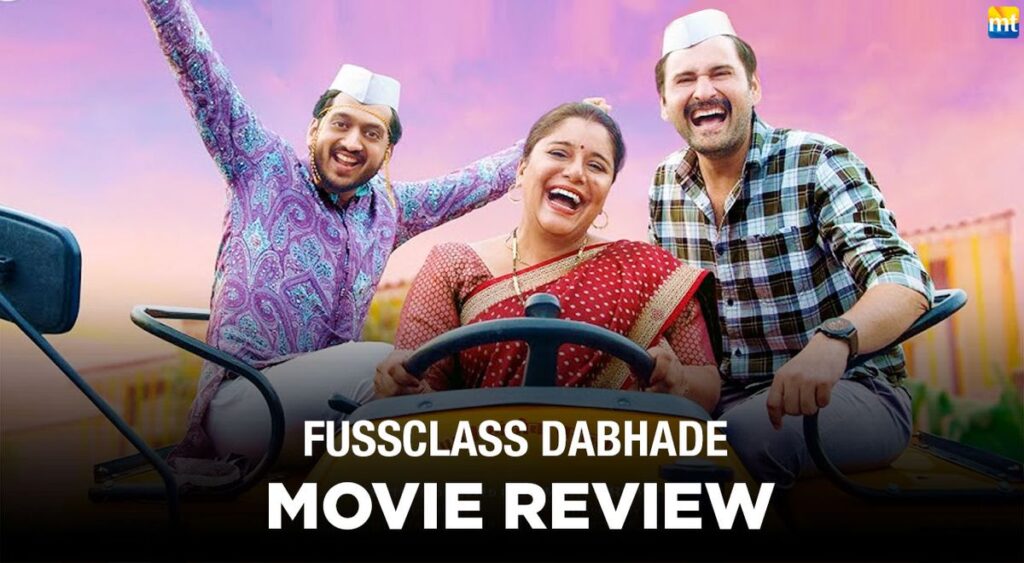RATING – ⭐ ⭐ ⭐ 3/5*
Fussclass Dabhade Review Movie Talkies:
After Jhimma and Jhimma 2, Hemant Dhome and his team do it again! This time, in the family drama genre—a much needed change. This genre hasn’t seen many great films in Marathi cinema unless you go back to the popular family dramas (mostly melodramas) of the 80s and 90s, or the last one I remember, “De Dhakka” (2008). Fussclass Dabhade brings this dormant genre to life yet again, despite some unnecessary flaws. On a scale of 20, it has 10 moments to cherish and love, 5 moments that weren’t necessary, and 5 other moments that are predictable but decent. It does seem to have borrowed material from various films and daily soaps to create a purely traditional, village-driven, and rooted family comedy-drama in the Marathi industry.
/movietalkies/media/media_files/2025/01/28/fussclass-dabhade-review-dhfh.jpg)
Fussclass Dabhade Review (Story):
The film begins with the wedding ceremonies of the youngest son of the Dabhade family, Sonu (Amey Wagh). His elder brother, Kiran (Siddharth Chandekar), has just returned home for the wedding, while the eldest sister, Jayashree (Kshitee Jog), is mostly around the house. Sonu and Jaya share a regular brother-sister relationship, but Kiran is somewhat sour about the family and its members, including his father and siblings. The reason for this is revealed through his past, a broken marriage. After Sonu’s wedding, the family members start fighting and arguing with each other, especially Kiran, who is the main instigator. Will they be able to understand their mistakes and return to their previous bond?
/movietalkies/media/media_files/2025/01/28/fussclass-dabhade-review-dkfj.jpg)
Hemant Dhome has written a fantastic script, even though it doesn’t seem entirely original. The theme of erectile dysfunction or performance pressure is reminiscent of “Shubh Mangal Savdhaan”; IVF and infertility have been depicted in many films before, and a character’s anguish over an ex-girlfriend, now someone’s wife, has been used in countless films. The family drama, conflicts, arguments, and basic themes are clearly borrowed from our regular daily soaps, but with better execution that avoids being overly dramatic. A few modern ideas like honeymoon, condom, family planning, and consulting a venereal doctor seemed unnecessary, but Dhome included them for the sake of a “modern touch,” which I believe undermines the film. The motive and essence of the narrative are so natural, organic, and rooted; why incorporate modern ideas and attempt to mix them with our simple family bonds? Even De Dhakka featured a woman without a child, but did not try to make it look intentional. Fussclass Dabhade falters there, and probably only there.
/movietalkies/media/media_files/2025/01/28/fussclass-dabhade-review-sofh.jpg)
On the positive side, the film has at least ten moments that will move you, touch you, and make you emotional. Some scenes looked so real; I could feel and relate to exactly what happens in families on a daily basis (even in Mumbai). Sonu calling Virat Kohli “Chiku,” Komal’s frightening expressions while getting intimate with Sonu, Kiran’s jealousy over his ex, Madhuri’s agony regarding his jealousy, and especially that speech where she finally confronts Kiran, stating that her husband is a much better man than he could have ever made himself in life: Sachin and Jaya’s sweet bonding, Jaya’s constant struggle with her natural flaws as a woman/mother, Solochana/mother’s overly caring nature, the father’s honest and highly respectful attitude, and that one dramatic Shanta Akka we all have in our families. Dhome has provided a proper buffer that we haven’t tasted in years. Did I forget to mention the spicy candy, Manju? How sexy and wild that character is for a film set in a village!
Christopher Nolan to shoot his next film, “The Odyssey,” at “Goat Island,” where Odysseus landed
/movietalkies/media/media_files/2025/01/28/fussclass-dabhade-review-dodh.jpg)
The film is also blessed with some good performances, and almost everyone in the cast has done well. Amey Wagh and Siddharth Chandekar have done fine jobs; Kshitee Jog is too good, Harish Dudhade is superb, Rajasi Bhave has been surprisingly good, Usha Nadkarni does it in her style, and I love that. Rajan Bhise, Mitali Mayekar, Nivedita Saraf, and Kalabai Nakti have done exactly what was needed, Suyog Gorhe looks handsome, and last but not the least, Trupti Shedge was fire! Shivani Surve appears in a blink-and-miss cameo and looks stunning in that one frame, but that moment wasn’t explored well later. The film lacks hit numbers, but all the songs are visually splendid; they are just fine, and the production design has been quite impressive. Hemant Dhome has given us the first “Good Watch” in 2025 in Marathi cinema, and we should all be thankful to him. I hope he continues in the same form and doesn’t slip like he did before Jhimma. He ALMOST hits it out of the park with Fussclass Dabhade, a level that many Marathi directors have failed to achieve in recent times. It’s just that a few modern theories make the film look cheap and vulgar at moments, spoiling the momentum for a while. Nevertheless, it’s still a good watch, if not a very good one.

